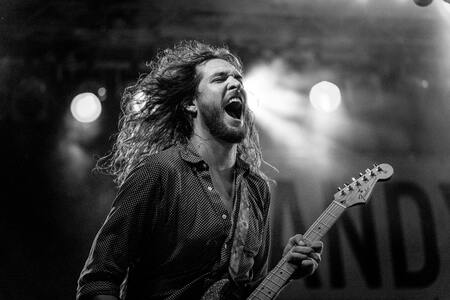
Living the dream on stage is awesome, right? But it’s tough on the body and mind.
Late nights, endless rehearsals, tight travel schedules, and constant noise exposure can wear you down if you’re not careful.
Your well-being is your most important instrument. Ignoring it can lead to burnout and injuries. Even issues like hearing loss are becoming more common among musicians. Many approach specialists for hyperacusis treatment—that’s a condition when normal sounds start feeling painfully loud.
Well, there are ways to address these concerns and focus on your career. Here, we’ll share simple, doable steps to help you stay healthy on and off stage.
#1 Move That Body Beyond the Stage
Jumping around on stage, carrying gear, and loading into venues absolutely count as physical activity. But don’t let that be your only form of movement.
Performing tends to involve one kind of movement: repetitive and high-energy and weirdly one-sided if you’re a drummer or a bass player.
What you need outside of that is an intentional movement that balances things out. That doesn’t mean training for a marathon. It could be a 20-minute stretch session or a walk after soundcheck. Even a bit of strength training can help you survive those five-set nights or long-haul flights without feeling like a pretzel.
Virginia State University states that regular physical activities boost cognitive function and concentration. For musicians, this translates to improved focus during performances and practice sessions. This leads to a higher level of musicality as well as precision.
So, stretch it out. Stretching will help improve flexibility as well as the range of motion in your joints. Do a bit of cardio. Cardio exercises like running, swimming, or cycling can significantly improve stamina and strengthen the heart and lungs.
#2 Don’t Skimp on Sleep
The life of a musician isn’t exactly built around early bedtimes and eight hours of rest.
Late-night shows, early load-ins, and post-gig adrenaline make getting quality sleep a challenge. But that doesn’t mean you can ignore it.
Your brain needs sleep to learn new things. It locks in those new songs or techniques. Good sleep sharpens your focus and boosts your memory. You’ll make fewer mistakes on stage.
Your voice also needs that downtime. Living A Vocal Life calls sleep one of the essential building blocks for good vocal health. When you get a good night’s sleep, your vocal cords get time to rest and repair. Cells in your vocal cords regenerate during that time.
Alongside sleep, consistent vocal practice is key to building endurance and control. Many singers now turn to online vocal lessons as a convenient way to improve their technique, especially useful during downtime or between tours.”
Late nights are normal in this biz. But try to get 7 to 9 hours of sleep. Create a wind-down routine. Dim the lights an hour before bed. Read a book instead of using the phone. That is because the screen’s blue light messes with sleep. Try some calming herbal tea.
And when you’re traveling, take short naps whenever you get time.
#3 Protect Your Hearing
Hearing is the foundation of your craft. But the very nature of your work puts you at risk of noise-induced hearing loss. It doesn’t come back once it’s gone.
Musicians—Beethoven, Eric Clapton, Brian Wilson, Phil Collins, and Pete Townsend—have struggled with hearing loss.
Many musicians develop tinnitus—a constant ringing or buzzing sound. This damage adds up slowly. Over time, it can even lead to hyperacusis.
According to the Sound Relief Tinnitus & Hearing Center, symptoms of hyperacusis include increased sensitivity to environmental sounds or decreased sound tolerance.
Sounds over 85 decibels are risky. That’s about as loud as a vacuum cleaner. Rehearsals and concerts are often much louder.
To keep your ears safe use earplugs in practice, rehearsals, shows, and even loud clubs. Custom-molded musician’s earplugs are the best bet. They lower the volume evenly and the music still sounds clear, just quieter.
Also, don’t blast your in-ear monitors. Set them at a comfortable level, and give your ears breaks when you can.
#4 Drink Plenty of Water
Hydration is non-negotiable when you’re a performing musician. You’re sweating under stage lights, moving like crazy, maybe singing your face off, and trying to keep your energy high. All of that drains your system fast.
If you’re not replacing that lost fluid, your body will show signs of dehydration. You’ll feel dizzy or lightheaded, have headaches, and experience muscle cramps. It may even cause your heart to beat faster to compensate for lower blood volume. That isn’t exactly the vibe you want on stage.
Keeping yourself hydrated keeps the cells inside your vocal box nourished. The vocal cords get tired faster when your body is dehydrated. You wouldn’t want that mid-show voice crack or that raspy struggle in the last chorus.
The easiest way to stay hydrated? Sip water all day long. Carry a water bottle everywhere, so you can sip often.
Hydrate on stage. Keep water close by during gigs and sip between songs or during breaks. Water at room temperature is often best.
Bottom line? Taking care of yourself as a performing musician isn’t some luxury. It’s smart planning for a long career. These small steps really add up, so incorporate them into your daily life. You’ll feel better, perform better, and keep making amazing music for years to come.
